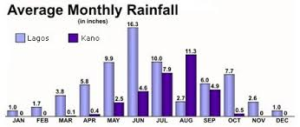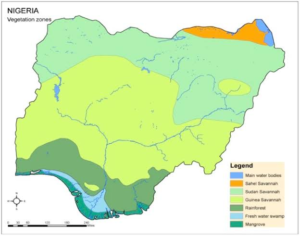Back to: Agricultural Science Primary 6
Welcome you all to class
Climate is the average weather condition of an area over a long period of time. The things that make up the climate are rainfall, temperature, light or sunshine and wind. Climate isn’t the same thing as weather. Weather is the condition of the atmosphere over a short period of time. Climate is the average weather in a place over many years. While the weather can change in just a few hours
Rainfall
Rainfall is the amount of rain that falls on an area in a particular period of time.Rainfall in the country is not uniform. In the south, rainfall is heavy during the rainy season. The average rainfall is between 2 400 mm and 2 600 mm. In the mangrove zone, it is about 2 600 mm and above. In the north central (formerly middle belt), rainfall is between 1200. mm and 2 400 mm while in the north, it is between 800 mm and 1 200 mm.
Different crops or plants require different amounts of rain for their growth and development. Animals also drink water as part of their feeding.

Temperature
Temperature is a measure of how hot or cold a place is at a particular time. This is usually measured in degrees celsius(oC). There are two main seasons in Ni-
geria: the wet or rainy season and the dry season. Temperature is usually high in the dry season except during the harmattan period. In the rainy season, the temperature is usually low due to rain. Temperature determines the distribution of plants and animals in the country. Crop plants require different temperature conditions for seed germination, growth and maturity.
Sunshine
This refers to the rays of light from the sun. The country is in the tropical zone, and so, it enjoys sunlight almost throughout the year. Crop plants grown in this tropical zone require sunlight throughout the year for growth and maturity of their fruits and pods.
Wind
Wind is air that is moving in space or in the atmosphere with some force. It can be observed as trees, shrubs and even clothes bend or move under its force. There are two types of wind blowing across the country: the south-west trade wind and the north-east trade wind. The south-west trade
wind blows into the country from the Atlantic ocean and brings rain. This oc-
curs mostly in the rainy season, i.e. from March to October. The north-east trade
wind blows into the country from the sahara desert between November and Feb-
ruary with dry and dusty air. It brings the harmattan.
Wind helps to determine the amount of rain and the types of forest zones that
exist for agriculture.

MAP SHOWING VEGETATION ZONES IN NIGERIA
EVALUATION
- Mention the factors that determines the climatic condition of a place
